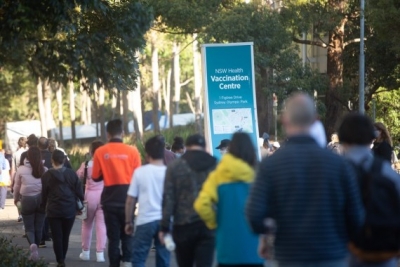Aus should change current vax strategy to achieve herd immunity
By IANS | Published: September 6, 2021 02:39 PM2021-09-06T14:39:05+5:302021-09-06T14:55:15+5:30
Canberra, Sep 6 A new Covid-19 pandemic tracking model revealed on Monday that Australia's current vaccination strategy should ...

Aus should change current vax strategy to achieve herd immunity
Canberra, Sep 6 A new Covid-19 pandemic tracking model revealed on Monday that Australia's current vaccination strategy should now prioritise administering the Pfizer jab to people aged between 12 and 40 years old to achieve herd immunity.
The findings, published in the Medical Journal of Australia (MJA), were made from a new model developed by James Cook University (JCU), reports Xinhua news agency.
The model incorporated age-specific mixing, infectiousness, susceptibility, and severity to assess the impact of the epidemic under different public health intervention scenarios, and it also examined different vaccination programs, such as AstraZeneca only, Pfizer only, and the mixed program of vaccinating.
Epidemiologist Professor Emma McBryde from JCU's Australian Institute of Tropical Health and Medicine said the modeling showed Australia's current strategy of vaccinating the vulnerable older age groups first is the optimal strategy for reducing hospitalisations, deaths, and years of life lost, but it may be "unlikely to achieve herd immunity" due to the uncertain effective reproduction number of the Delta strain.
"The current plan to vaccinate 80 per cent of the adult population, or about 65 per cent of the total population, falls far short of herd immunity," said McBryde.
She said there were uncertainties in the forecast, but the estimated range of the number of people that one infected person could pass the virus on to is from three to seven.
If at the midrange of most estimates, a reproduction number of 5, at least 85 per cent of the population, including children, would need to be vaccinated to achieve herd immunity.
The team investigated two alternative strategies for vaccine distribution, the first focused on vaccinating the vulnerable (people 55 and over) and the second prioritises vaccinating the most infectious (those under 55), and suggested that Australia should now prioritize delivering Pfizer vaccine to younger age groups.
"We are unlikely to achieve herd immunity at the most plausible reproduction number of five unless vaccination is extended to younger ages or combined with other measures. Australia should now prioritize delivering Pfizer vaccine to 12-40 years old," said McBryde.
There has been a hot discussion about the vaccination of children as the current COVID outbreak saw more people at younger age were admitted into hospitals. The Sydney Children's Hospital Network is supporting more than 2,000 children with Covid-19 including three children who are currently receiving intensive care.
McBryde added if the virus reproduction number is three, the current program can achieve herd immunity at 60 to 70 per cent coverage without vaccinating five to 15-year-old children, but on the other side of the ledger, an effective reproduction number of seven, means achieving herd immunity without vaccinating children would be impossible.
Disclaimer: This post has been auto-published from an agency feed without any modifications to the text and has not been reviewed by an editor
Open in app